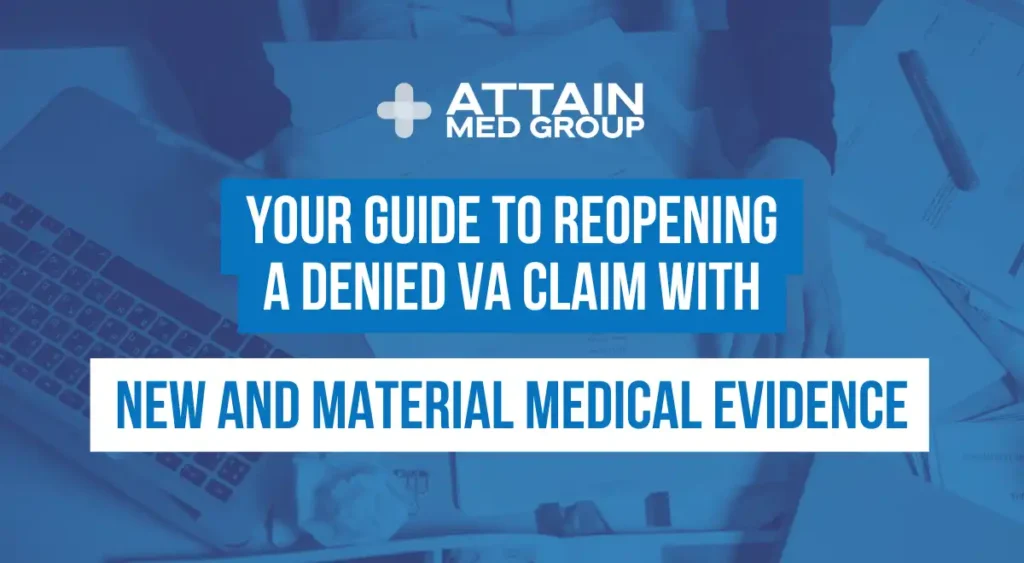Getting that denial letter from the VA can feel like hitting a brick wall. You put your heart, soul, and stacks of paperwork into your VA claim, hoping for the disability benefits you deserve. Seeing it denied or finding out it’s been closed can be discouraging.
But here’s something really important to know: a denied VA claim isn’t always the final word. This is Your Guide to Reopening a Denied VA Claim with New and Material Medical Evidence, and it’s possible to get your claim looked at again, potentially leading to the VA benefits you earned.
Many veterans, including those from the Army, Air Force, or National Guard, don’t realize that even after a VA disability claim is officially closed, you often have the option to reopen it. The solution involves presenting what the VA calls “new and material evidence.” This guide, Your Guide to Reopening a Denied VA Claim with New and Material Medical Evidence, will walk you through how this works for your disability claims.
What Does ‘New and Material Evidence’ Actually Mean?
Let’s clarify these official-sounding terms. “New evidence” is simply information the VA hasn’t seen before regarding your specific disability claim. It wasn’t part of the file they reviewed when making their original decision.
“Material evidence” refers to information that is relevant and significant to your claim. It must be the type of information that could reasonably change the VA’s decision if they considered it. This relevant evidence needs to directly relate to the reason your VA claim was denied initially.
Therefore, “new and material medical evidence” is fresh, pertinent information that addresses the reason for denial and could realistically lead to a different outcome for your va disability claims. It’s not about resubmitting old details or sending duplicates. The evidence must add significant substance to your case; medical evidence matters significantly here.

Types of Evidence That Can Qualify as New and Material
What kind of information fits this description? It depends on your specific circumstances and why your claim faced denial. Here are some common examples of evidence that supports stronger cases:
- Updated Medical Evaluations
Perhaps your condition has worsened since you first filed your claim. A new evaluation documenting increased severity or new symptoms can be powerful new medical evidence. This could come from a VA doctor or private medical professionals. - New Medical Opinions (Nexus Letters)
This is crucial for many denied va claims. Often, claims are denied because the VA doesn’t see a clear link (nexus) between your condition and your military service. A nexus letter from a qualified, licensed medical professional can explicitly establish that service connection. - New Diagnoses
Maybe you received a new diagnosis related to your service, perhaps due to toxic exposure like Agent Orange or burn pit exposure from the Gulf War. Alternatively, you might have a secondary condition linked to an already service-connected disability. This counts as new evidence; for instance, developing sleep apnea secondary to PTSD is relevant evidence. - Buddy Letters or Lay Statements
Statements from people who know you (friends, family, fellow service members) can describe how your condition impacts daily life or its origins. If these details weren’t submitted previously, they could be new and material evidence, especially when they support medical findings. You can often use VA Form 21-10210 for these lay statements. - Records Previously Overlooked or Unavailable
Sometimes, essential records weren’t included in the initial VA claim. These could be old service treatment records, private medical records, or documents missed the first time. Locating and submitting these records, potentially showing treatment for conditions like rheumatoid arthritis or a spinal cord injury, can be critical.
It’s about providing information that fills the gaps leading to the denied va status. The medical evidence supports stronger arguments when it has substance and direct relevance to your claim circumstances. Sometimes, this involves addressing issues related to Camp Lejeune water contamination or other specific service events.
Here’s a quick summary of potential evidence types:
| Evidence Type | Why It’s Helpful | Example Scenario |
| Updated Medical Evaluations | Shows worsening of condition or new symptoms. | Increased pain from a back injury impacting work ability. |
| Nexus Letters | Establishes service connection (link between condition and service). | Doctor explicitly links current PTSD to combat experiences. |
| New Diagnoses | Provides proof of a new related condition (primary or secondary). | Diagnosis of diabetes secondary to a service-connected condition. |
| Buddy/Lay Statements | Offers non-medical perspective on symptoms and impact. | Spouse describes veteran’s daily struggles with anxiety disorder. |
| Overlooked Records | Fills gaps in medical or service history previously missing. | Finding service treatment records showing early complaints of joint pain. |
Common Reasons VA Claims Are Denied (and How New Evidence Helps)
Understanding why va disability claims get denied helps you determine what kind of new medical evidence is necessary. While reasons differ, certain themes frequently arise. Recognizing these common denial reasons can help focus your efforts on gathering the right documentation.

Lack of Service Connection (No Nexus)
This is perhaps the most frequent reason for a denied VA claim. The VA might acknowledge you have a condition, like multiple sclerosis or a traumatic brain injury, but they don’t see adequate proof that it started during or resulted from your military service. They require evidence establishing that link, or “nexus.”
How New Evidence Helps: This is where a strong nexus letter from expert medical professionals is invaluable. An independent medical opinion stating your condition is “at least as likely as not” related to your service can directly address the VA’s reason for denial. Submitting overlooked service records showing relevant incidents, treatments, or exposure details (like burn pit exposure) can also help establish this service connection.
Insufficient Documentation of Severity
Sometimes, the VA acknowledges a service-connected condition but assigns a 0% disability rating or a lower rating than you think is accurate. This often occurs because the submitted evidence didn’t fully demonstrate how severely the condition impacts your ability to work or function daily. Getting the correct disability rating is vital for receiving appropriate compensation.
How New Evidence Helps: Updated medical evaluations detailing worsening symptoms or functional limitations are crucial here. Detailed lay statements describing the day-to-day impact, perhaps using a true story example, can also paint a clearer picture for the VA rater. An Independent Psychological Evaluation (IPE) can be particularly helpful for mental health conditions like bipolar disorder or other neurological disorders, outlining occupational and social impairment.
Missing or Incomplete Medical Records
The VA needs a complete view of your medical history related to the condition claimed. If key private medical records or service records are missing, they might deny the claim due to insufficient information. They cannot grant benefits without the necessary proof.
How New Evidence Helps: Locating and submitting those missing records is the clear solution. A thorough Medical Record Review might identify records referenced but never actually obtained by the VA during the initial review of the original decision. This review could also highlight existing medical evidence within the files that supports your claim but was previously overlooked by the VA.
Leveraging Independent Evidence
While you can submit medical evidence from VA doctors, obtaining independent, third-party expert medical evidence can be very effective. This involves documentation developed outside the VA system specifically to meet the requirements of your VA claim. This approach provides focused, detailed reports aligned with VA standards, as expert medical evidence supports stronger cases.

The Impact of Nexus Letters
As previously noted, nexus letters are vital when service connection is the primary issue in a denied va situation. A well-crafted nexus letter does more than simply state a medical opinion. It involves reviewing your entire claims file (C-file), relevant medical literature, and service history to provide a detailed rationale connecting your condition to your service events, potentially including toxic exposure incidents.
An independent medical expert specializing in these letters understands VA requirements precisely. They know the specific phrasing (“at least as likely as not”) and the level of detail needed for the evidence support. This differs from a standard doctor’s note, which might not address the legal standard required for VA disability benefits.
Showing the True Impact with Independent Psychological Evaluations (IPEs)
For mental health conditions like PTSD, depression, or an anxiety disorder, demonstrating the true severity and its link to service can be complex. An IPE performed by a private, licensed medical professional (psychologist or psychiatrist) can offer an in-depth analysis of your condition. These evaluations typically include extensive interviews, psychological testing, and a review of your personal and service history.
The final report details your diagnosis, symptoms, and, critically, how the condition impairs your ability to work and maintain social relationships. This detailed description of functional impairment provides the VA rater with concrete information needed to assess the severity level accurately for your disability rating. Licensed medical professionals helps provide this clarity.
Finding Support in Medical Record Reviews
Sometimes the medical evidence needed to successfully reopen your claim is already within your existing medical records but was missed or misinterpreted. An independent Medical Record Review involves an expert carefully examining your entire VA C-file and other relevant medical documents. They search for errors, omissions, or overlooked positive evidence that supports stronger cases.
This review process can uncover diagnostic codes, treatment notes, or test results supporting your disability claim that weren’t properly considered before. The reviewer can then emphasize this existing evidence, effectively making it “new” for the VA rater evaluating your supplemental claim. It provides a fresh, expert perspective on the established facts; evidence supports stronger outcomes when properly presented.

How Attain Med Group Helps Veterans Reopen Claims
Dealing with denied VA claims and gathering the necessary relevant evidence can feel overwhelming. You served your country, and dealing with this system can seem like another difficult mission. Organizations specializing in VA-focused medical evidence can offer valuable assistance during the appeals process.
Attain Med Group, similar to services like Trajector Medical, concentrates specifically on generating thorough, evidence-based medical documentation that meets the VA’s standard for “new and material evidence.” They understand VA regulations and what raters require to approve a reopened claim or a supplemental claim. Their network includes licensed medical professionals experienced in conducting Nexus Letter reviews, Independent Psychological Evaluations, and detailed Medical Record Reviews; this expert medical evidence supports stronger arguments.
Their approach aims to directly address common reasons for denial. If your initial claim lacked a nexus, they work to provide a well-reasoned medical opinion connecting your condition to your service. If the severity was underestimated, their evaluations seek to document the full extent of your functional impairment, potentially impacting your disability calculator results and leading to increased disability benefits.
Using a service focused on expert medical evidence means obtaining documentation developed with the specific goal of successfully reopening your denied VA claim. It adds substantial weight to your case file, improving your chances of getting the VA benefits you earned. They help confirm the evidence submitted is truly new, material, and presented clearly for the VA’s consideration, recognizing that medical evidence support is critical.
Remember, a denial doesn’t have to be the definitive end, nor does it always mean you need a disability lawyer immediately, though veterans appeals can become complex. Understanding the rules surrounding new and material evidence empowers you. Taking action to gather that specific evidence, perhaps through a supplemental claim using the appropriate VA form, is the necessary next step.
Submitting a supplemental claim (VA Form 20-0995) is often the primary way to have the VA reconsider a previously denied claim based on new and material evidence. This process is distinct from other appeal options like a Higher-Level Review or a Board Appeal. A supplemental claim specifically focuses on adding new information to the record for review.
The VA has a “duty to assist” veterans in obtaining evidence for their claims, but the responsibility ultimately falls on the veteran to provide evidence that meets the “new and material” standard. This might involve gathering private medical records, service personnel files, or expert opinions. If the VA made an unmistakable error in the original decision, that could be grounds for a different type of challenge, but new evidence typically requires the supplemental claim pathway.
Conclusion
Facing a VA claim denial is tough, but it doesn’t mean your fight for disability benefits is over. The VA system allows for denied va claims to be reopened if you can provide new and material medical evidence that addresses the reason for the initial denial. This evidence must be information the VA hasn’t seen before that is relevant and could realistically change the outcome of your disability claim.
Understanding what qualifies—like expert medical evidence in nexus letters, updated evaluations showing condition changes, or newly discovered records related to toxic exposure or specific injuries—is essential. Leveraging independent medical evidence specifically developed for VA standards, often by licensed medical professionals, significantly supports stronger cases. Knowing that evidence supports stronger arguments is the first step; finding that evidence is the next.
Hopefully, Your Guide to Reopening a Denied VA Claim with New and Material Medical Evidence has shown there is a path forward after a denial. With the right new information submitted via the proper channel, like a supplemental claim, you can ask the VA to take another look. This process offers a real chance to potentially secure the service connected VA benefits you rightfully deserve based on your service and sacrifice.

